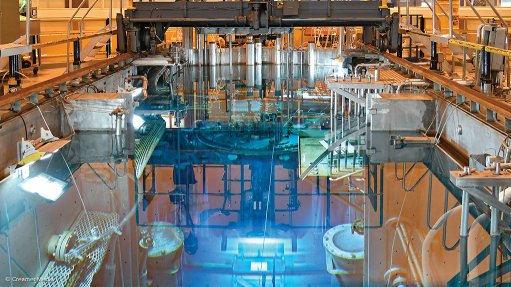
The SAFARI-1 reactor
Photo by: Creamer Media's Donna Slater
The South African Nuclear Energy Corporation (Necsa) has formally requested Mineral Resources and Energy Minister Gwede Mantashe to change its mandate, to allow it to become involved in the generation of electricity from nuclear energy. So Necsa CEO Loyiso Tyabashe has told Engineering News in an exclusive interview.
Currently, only the State-owned national electricity utility Eskom is permitted to operate nuclear power plants (NPPs). The country has only one NPP, at Koeberg, north of Cape Town. Under South Africa’s current Integrated Resources Plan (IRP), the country is seeking to create 2 500 MW of new nuclear power generating capacity (although no nuclear capacity would come on stream for at least ten years after authorisation was granted). Necsa would like some of that allocation to be assigned to it.
“We would focus on small modular reactors (SMRs) and microreactors,” explained Tyabashe. “We’re not competitors with Eskom. We’re one nuclear family. While Eskom concentrates on conventional nuclear reactors that are already commercial, Necsa’s interest is in innovative approaches and applications of nuclear energy such as SMRs. There’s a good case for nuclear energy. Worldwide, many countries recognise that they can’t decarbonise without nuclear. The ‘energy trilemma’ is addressed by nuclear – it provides energy security, with assured baseload power; it’s the cheapest electricity for the consumer; and it doesn’t generate carbon emissions. The allocation of the megawatts generated from nuclear depends on the IRP, which gets updated.”
Currently, Necsa is restricted, under its mandate, to operating a research reactor, designated SAFARI-1. Located in the corporation’s Pelindaba complex, west of Pretoria, this was commissioned in 1965.
“SAFARI-1 is performing very well,” he reported. “It remains one of the best operated research reactors in the world. Its [‘swimming pool’] design doesn’t have a predetermined end-of-life. We have an ageing management strategy for it, in agreement with the National Nuclear Regulator.”
The research reactor is essential for the production of radioisotopes, for both industrial and especially medical purposes, by Necsa subsidiary NTP Radioisotopes. Necsa does not want there to be any interruption in supply, so it plans to commission a new reactor while SAFARI-1 is still in operation.
The new reactor is designated a Multipurpose Reactor (MPR). The feasibility study for the MPR is currently under way and is expected to be completed by the end of this financial year (that is, by March 31, 2024). Once completed, it will be submitted to the Mineral Resources and Energy Minister.
“In the meantime, we manage SAFARI-1 as if it is not going to be retired soon,” said Tyabashe.